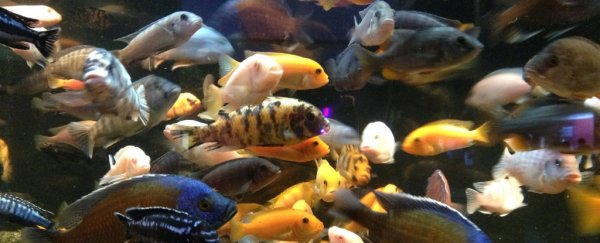When humans choose the wrong mate, it can end in divorce. When cichlids choose the wrong mate, it can fuel the development of a whole new species.
That's not a bad outcome for what's usually an unfortunate mistake, and it's one of the main reasons this colourful little fish is so exceptionally diverse, coming in a whole range of bright patterns, shapes and sizes.
Usually found in the freshwater lakes of Africa, cichlids have a habit of flopping into bed with the wrong partner. When the waters are murky and the details are fuzzy, the females can accidentally introduce new genes into their population, a decade-long study on Lake Mweru in the Congo has found.
"This could have been because when the lake formed, the water was very cloudy and they couldn't see colours properly so the females were not being as choosy about selecting a mate in their new environment," says evolutionary biologist Joana Meier from the University of Cambridge.
"Mating between cichlids from different drainage systems produced very diverse offspring combining the genetic traits of both parental species."
Over a relatively short period of time, the authors say, those mistaken escapades triggered an explosion of new fish. Today, in fact, cichlids are one of the most diverse groups of fish on planet Earth, and we currently know of some 2,000 species - although scientists suspect there's plenty more.
In Lake Mweru, for instance, the new study turned up 40 new species. But when the lake was first formed, about a million years ago, this body of water only contained cichlid lineages from the Congo and the Zambezi.
Further DNA analysis revealed these new fish came from a mix of both ancestors.
"We found a dazzling variety of ecologically diverse new species — called radiations — that were previously unknown," says Meier.
"The new species of cichlids adapted to use all the available food resources in the lake. Some feed on insect larvae, others zooplankton or algae. Some newly discovered fish are predators with large teeth, which we named 'large-tooth serranchromines'."
Many cichlids alive today have evolved only recently, meaning in the past million years or so. In Lake Malawi, for example, more than 800 species have descended from the original cichlids that lived there up to 2 million years ago. And in Lake Victoria, there are more than 700 diverse species of cichlid that have all evolved in the last 150,000 years.
This rapid case of evolution has produced many distinct species that are genetically compatible, meaning they can produce viable and fertile hybrid offspring. As a result, some researchers argue that hybridisation is what has led to such great cichlid diversity.
Testing this in the lab, researchers found that when cichlids mate, the females are in charge. But sometimes, when the light is dim or the male has similar colourings, the bachelorette can make the wrong choice.
The authors suspect this is probably what happened all those million years ago, when the original lineages of cichlids came face to face in a newly-formed lake.
Meier told Newsweek that because hybrids contain genes from two different species, selection forces can act on a larger diversity and choose those individuals who are better suited for particular habitats, keeping competition relatively stable.
"Our research shows that hybridisation can fuel the evolution of new species which is a very novel finding," says Meier.
"The melting pot of Lake Mweru gave us a rare opportunity to study interactions between evolving new species and showed that in a new environment with lots of ecological opportunity hybridisation can be a good thing that actually increases biodiversity."
The study was published in Nature Communications.
